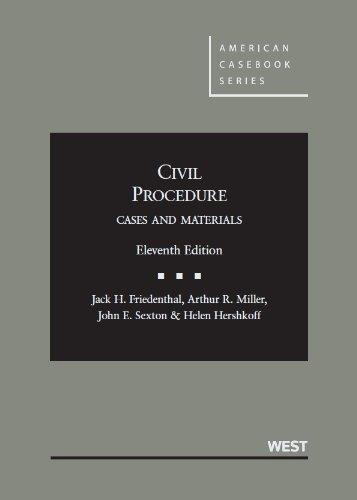1. The Conley litigation was brought by a group of African-American workers alleging that their union had...
Question:
1. The Conley litigation was brought by a group of African-American workers alleging that their union had discriminated against them in violation of the duty of fair representation under the federal Railway Labor Act. See Sherwin, The Story of Conley: Precedent by Accident, in Civil Procedures Stories 282 (Clermont ed., 2d ed. 2008). Justice Black’s papers suggest how the pleading standard in the Court’s opinion evolved:
The “no set of facts” language appears in Black’s initial draft and there is no suggestion in the papers that it was viewed within the Court as controversial in any way. * * * [The language] was borrowed from extant commentary of the time * * * [and] Black’s draft * *
* cited Moore’s Federal Practice for the proposition. The Court’s final decision substituted three case citations for Moore’s. But the powerful closing paragraph of the Court’s decision
[quoted above] underwent some interesting evolution, first at Black’s hand and then in response to a request from Justice John Marshall Harlan. After some revising, the paragraph appeared as follows when first printed and circulated within the Court on November 13, 1957:
The Federal Rules reject the approach that pleading is a game of skill in which one misstep by counsel may be decisive to the outcome and accept the principle that pleadings simply serve as a useful564means to facilitate a proper decision on the merits…. Under the Rules the best cause, not the cleverest pleader, is to prevail.
Black received the following note from Harlan later that same day:
Dear Hugo:
As you know, I have more of a yen for procedural rules than you have, and this leads me to ask you to consider omitting the last two sentences in the run-over paragraph on page 7. In suggesting this, I am prompted by two considerations; first, that what you say there is not at all necessary to your opinion, and second, that I like your opinion and want to be able to join it.
While I agree that we have moved a long distance away from the technicalities of common law and code pleading and properly so I think that proper pleading still has its place in the sound administration of justice!
Sincerely, JMH./s/
Black responded with the final language, which revised the next to last sentence of his opinion and dropped the last. * * *
Gavil, Civil Rights and Civil Procedure: The Legacy ofConley v. Gibson, 52 How. L.J. 1, 10–
12 (2008). How would the omitted language have affected the Conleypleading standard?
Step by Step Answer:

Civil Procedure Cases And Materials
ISBN: 9780314280169
11th Edition
Authors: Jack Friedenthal, Arthur Miller, John Sexton, Helen Hershkoff






